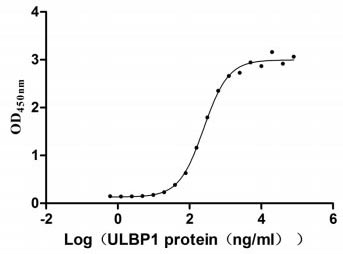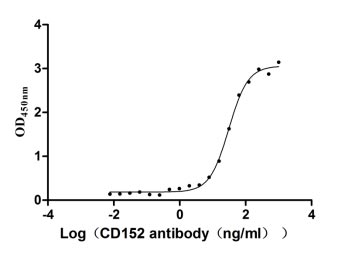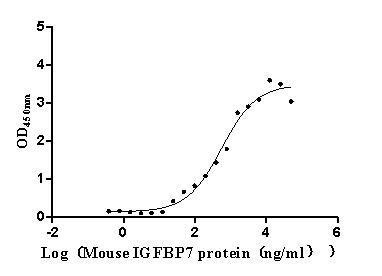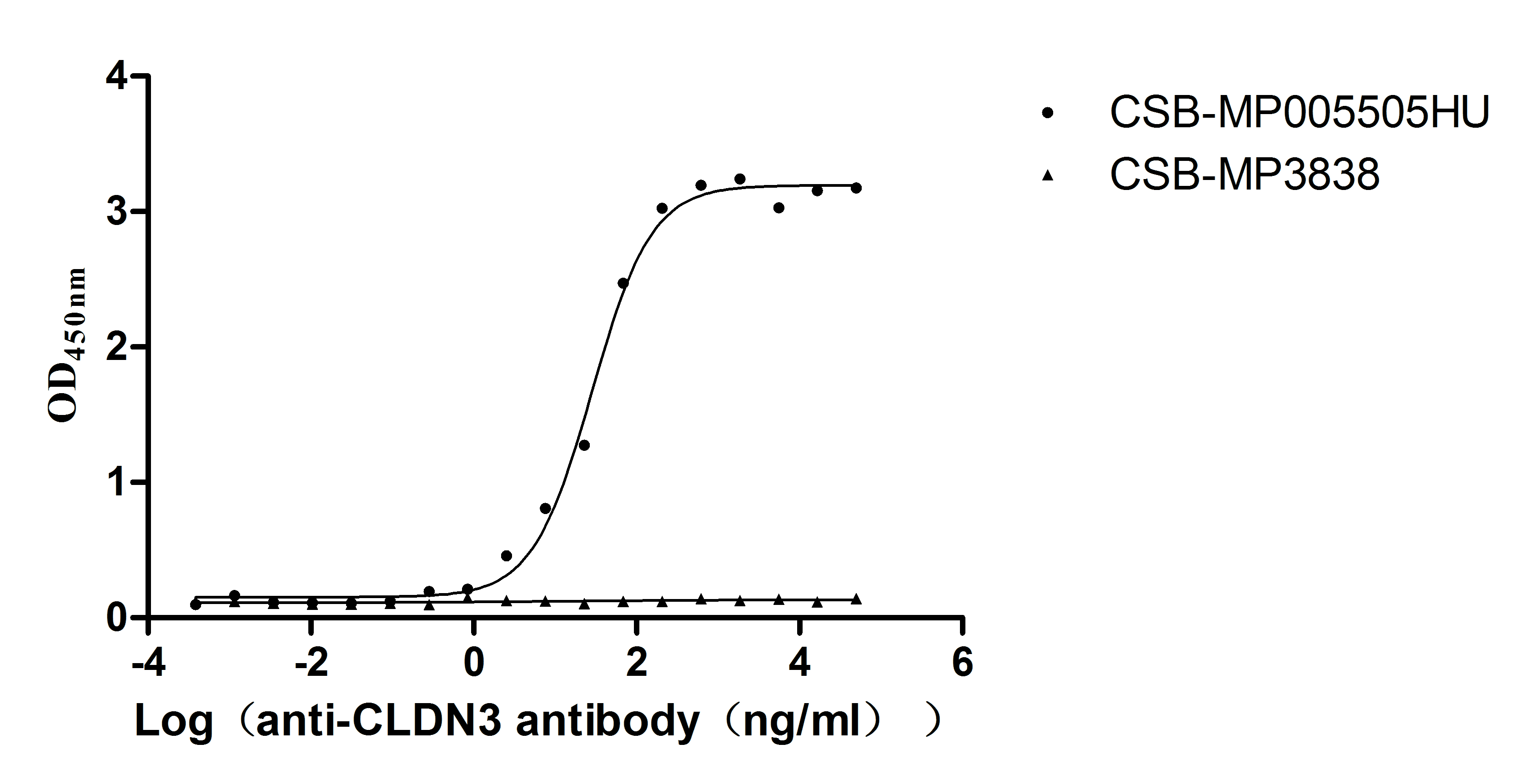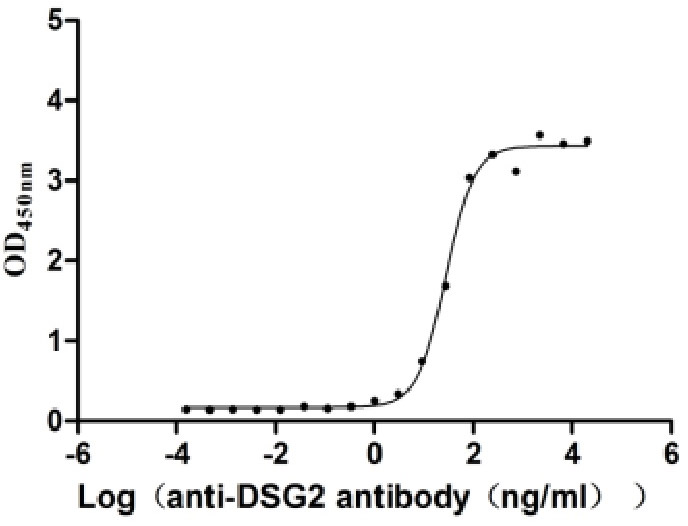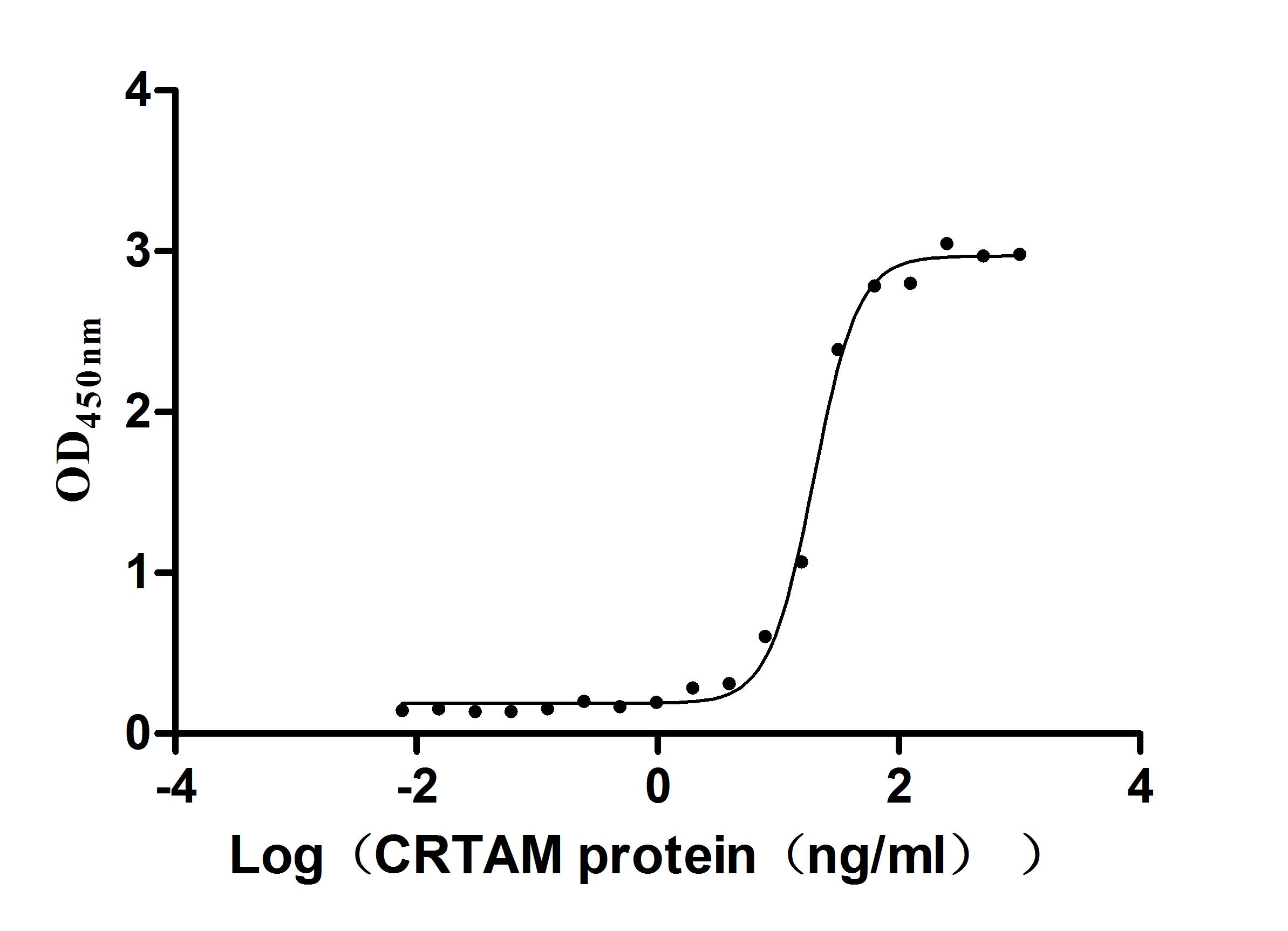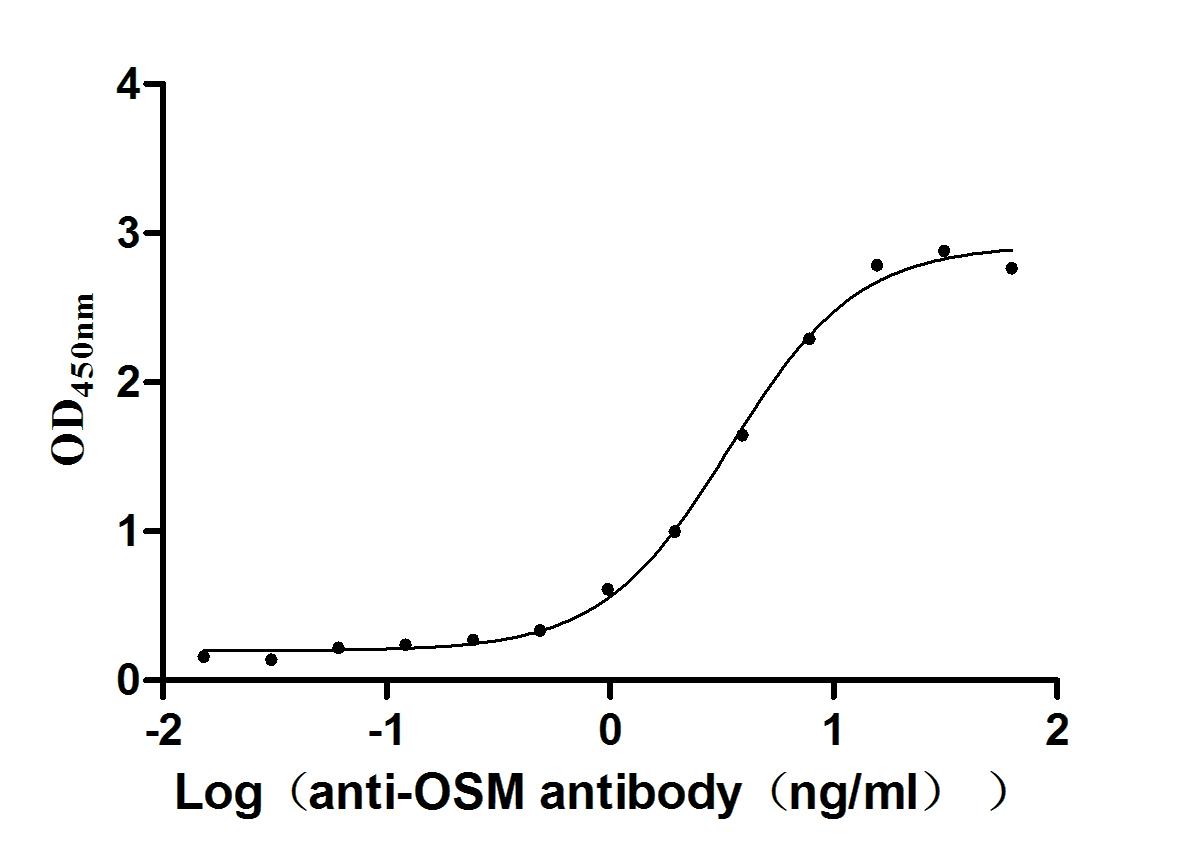Recombinant Mouse CD44 antigen (Cd44), partial
-
中文名称:Recombinant Mouse CD44 antigen(Cd44),partial,Yeast
-
货号:CSB-YP004938MO1
-
规格:
-
来源:Yeast
-
其他:
-
中文名称:Recombinant Mouse CD44 antigen(Cd44),partial,Yeast
-
货号:CSB-EP004938MO1
-
规格:
-
来源:E.coli
-
其他:
-
中文名称:Recombinant Mouse CD44 antigen(Cd44),partial,Yeast
-
货号:CSB-EP004938MO1-B
-
规格:
-
来源:E.coli
-
共轭:Avi-tag Biotinylated
E. coli biotin ligase (BirA) is highly specific in covalently attaching biotin to the 15 amino acid AviTag peptide. This recombinant protein was biotinylated in vivo by AviTag-BirA technology, which method is BriA catalyzes amide linkage between the biotin and the specific lysine of the AviTag.
-
其他:
-
中文名称:Recombinant Mouse CD44 antigen(Cd44),partial,Yeast
-
货号:CSB-BP004938MO1
-
规格:
-
来源:Baculovirus
-
其他:
-
中文名称:Recombinant Mouse CD44 antigen(Cd44),partial,Yeast
-
货号:CSB-MP004938MO1
-
规格:
-
来源:Mammalian cell
-
其他:
产品详情
-
纯度:>85% (SDS-PAGE)
-
基因名:
-
Uniprot No.:
-
别名:Cd44; Ly-24; CD44 antigen; Extracellular matrix receptor III; GP90 lymphocyte homing/adhesion receptor; HUTCH-I; Hermes antigen; Hyaluronate receptor; Lymphocyte antigen 24; Phagocytic glycoprotein 1; PGP-1; Phagocytic glycoprotein I; PGP-I; CD antigen CD44
-
种属:Mus musculus (Mouse)
-
蛋白长度:Partial
-
蛋白标签:Tag type will be determined during the manufacturing process.
The tag type will be determined during production process. If you have specified tag type, please tell us and we will develop the specified tag preferentially. -
产品提供形式:Lyophilized powder
Note: We will preferentially ship the format that we have in stock, however, if you have any special requirement for the format, please remark your requirement when placing the order, we will prepare according to your demand. -
复溶:We recommend that this vial be briefly centrifuged prior to opening to bring the contents to the bottom. Please reconstitute protein in deionized sterile water to a concentration of 0.1-1.0 mg/mL.We recommend to add 5-50% of glycerol (final concentration) and aliquot for long-term storage at -20℃/-80℃. Our default final concentration of glycerol is 50%. Customers could use it as reference.
-
储存条件:Store at -20°C/-80°C upon receipt, aliquoting is necessary for mutiple use. Avoid repeated freeze-thaw cycles.
-
保质期:The shelf life is related to many factors, storage state, buffer ingredients, storage temperature and the stability of the protein itself.
Generally, the shelf life of liquid form is 6 months at -20°C/-80°C. The shelf life of lyophilized form is 12 months at -20°C/-80°C. -
货期:Delivery time may differ from different purchasing way or location, please kindly consult your local distributors for specific delivery time.Note: All of our proteins are default shipped with normal blue ice packs, if you request to ship with dry ice, please communicate with us in advance and extra fees will be charged.
-
注意事项:Repeated freezing and thawing is not recommended. Store working aliquots at 4°C for up to one week.
-
Datasheet :Please contact us to get it.
相关产品
靶点详情
-
功能:Cell-surface receptor that plays a role in cell-cell interactions, cell adhesion and migration, helping them to sense and respond to changes in the tissue microenvironment. Participates thereby in a wide variety of cellular functions including the activation, recirculation and homing of T-lymphocytes, hematopoiesis, inflammation and response to bacterial infection. Engages, through its ectodomain, extracellular matrix components such as hyaluronan/HA, collagen, growth factors, cytokines or proteases and serves as a platform for signal transduction by assembling, via its cytoplasmic domain, protein complexes containing receptor kinases and membrane proteases. Such effectors include PKN2, the RhoGTPases RAC1 and RHOA, Rho-kinases and phospholipase C that coordinate signaling pathways promoting calcium mobilization and actin-mediated cytoskeleton reorganization essential for cell migration and adhesion.
-
基因功能参考文献:
- this study shows that absence of specific alternatively spliced exon of CD44 in macrophages prevents colitis PMID: 29186109
- this study demonstrates a new role for CD44 and hyaluronan in promoting alveolar macrophage survival PMID: 29067996
- CD44-positive proliferating glomerular cells, most likely parietal epithelial cells, are essential in the pathogenesis of scarring glomerular disease. PMID: 29276101
- We show here that cleavage-stimuli-induced specific ICD-modifications cause structural substrate changes that enhance ectodomain sensitivity of neuregulin-1 (NRG1; epidermal-growth-factor) or CD44 (receptor-tyrosine-kinase (RTK) co-receptor) to chymotrypsin/trypsin or soluble ADAM. PMID: 27876763
- TGF-beta1-mediated hyaluronan/CD44/STAT3 signaling pathway plays a crucial role in the development of atrial fibrosis and atrial fibrillation. PMID: 28871329
- The role of CD44 was evaluated in CD44(-/-) challenged with a methionine- and choline-deficient diet (MCDD). Liver inflammation, liver injury and fibrosis strongly decreased in CD44(-/-) mice compared to wild-type mice on MCDD. PMID: 28323124
- Data (including data from studies using transgenic mice) suggest that a single oral dose of vitamin A (1) amplifies tolerogenic activity of dendritic cells migrating to lymphoid tissue and (2) up-regulates expression of Foxp3 and Cd44 in co-cultures of dendritic cells and CD4+ lymphocytes. (Foxp3 = forkhead box P3; Cd44 = homing receptor) PMID: 28917953
- The pseudo-hypoxic phenotype of stem-like glioma cells is achieved by stabilization of HIF-2a through interaction with CD44, independently of oxygen. PMID: 28813675
- the survival outcomes of genetically induced glioma-bearing mice and of high-grade human glioma patients are biphasically correlated with CD44 level, with the poorest outcomes occurring at intermediate levels. PMID: 28052252
- pERK1/2 is a regulator of CD44 expression, and increased CD44 expression leads to a pro-sclerotic and migratory parietal epithelial cell phenotype in focal segmental glomerulosclerosis. PMID: 27998643
- MET signaling regulates intestinal homeostasis and regeneration, as well as adenoma formation. These activities of MET are promoted by the stem cell CD44 isoform CD44v4-10. PMID: 28716720
- study demonstrates that CD44 plays a critical role in the regulation of experimental autoimmune encephalomyelitis through alterations in the gut microbiome profile and short-chain fatty acid production PMID: 28543188
- CD44 variant isoform 9 emerges in response to injury and contributes to the regeneration of the gastric epithelium. PMID: 28497484
- OA/GPNMB acts through ERK and AKT signaling pathways in mesenchymal stem cells via CD44 PMID: 26442636
- These findings support the usefulness of the conditional Cd44 allele in unraveling essential physiological and pathological functions of CD44 isoforms. PMID: 27831556
- CD44 role in the atrophic epidermis PMID: 28099467
- CD44(high) type II cells likely represent a type II cell subpopulation important for constitutive regulation of alveolar homeostasis. PMID: 28473330
- CD44V6 is part of a positive-feedback loop with TGFbeta1/TGFbetaRI signaling that acts to increase NOX4/ROS production, which is required for myofibroblast differentiation, myofibroblast differentiation, myofibroblast extracellular matrix production, myofibroblast invasion, and myofibroblast contractility. PMID: 28389561
- HAS2-produced hyaluronan is required for CD44V6 and TGFbetaRI co-localization and subsequent CD44V6/ERK1/EGR1 signaling. These results demonstrate a novel positive-feedback loop that links the myofibroblast phenotype to TGFbeta1-stimulated CD44V6/ERK/EGR1 signaling. PMID: 28389562
- CD44 promotes accumulation of M2 macrophages, extracellular matrix deposition, and wall thickening during arteriovenous fistula maturation. PMID: 28450292
- CD44-expressing Neural Stem Cells are self-renewing and multipotent and they synthesize Hyaluronan that accumulates with aging. CD44-null Neural Stem Cells demonstrate increased proliferation in vitro and in vivo. PMID: 28154169
- CD44 knockout mice are more susceptible to stress-induced anxiety-like behavior than control mice. PMID: 27619521
- CD44 contributes to effective antibacterial defense during S. zooepidemicus infection, thereby limiting the accompanying injury and death. PMID: 28062002
- These studies demonstrate that both endometrial cell and peritoneal mesothelial cell CD44 play a role in the development of early endometriotic lesion. PMID: 26169039
- Targeting CD44 expressing colon cancer cells with anti-CD44 monoclonal antibody improves cellular uptake and antitumor efficacy of liposomal doxorubicin. PMID: 26518722
- depletion of CD44s inhibits breast cancer cell metastasis to the lung in animals. These findings suggest a crucial mechanism underlying the role of the CD44s splice isoform in breast cancer metastasis. PMID: 26869223
- MGK as hydrophobic moieties and oHA as the target of CD44 receptor. PMID: 24892632
- CD44, NOD2, and Fas have distinct functions in regulating changes in trabecular and cortical bone indices during unloading. PMID: 26546009
- The absence of CD44 in neonatal bone marrow has no impact on the size of the long-term reconstituting hematopoietic stem cell pool, but results in an enhanced long-term engraftment potential of hematopoietic stem cells. PMID: 26546504
- CD44 deficiency can reduce osteoclast activity and counteract cortical bone loss in the hindlimb of unloaded mice. PMID: 26530337
- Genetic deficiency of CD44 augments activation, apoptosis and pro-thrombotic potential of platelets. PMID: 26355696
- The high targeting ability of HA-MFNPs was observed at MKN-45 cells (gastric cancer cell line) which high-expressing CD44 in contrast with MKN-28 cells which low-expressing CD44. PMID: 27398445
- the aggravation of pulmonary inflammation upon combined exposure to allergen and an environmental pollutant is CD44-dependent. PMID: 26999446
- CD44 promotes chemoresistance in T-ALL by increased drug efflux. PMID: 26708679
- HA-binding to CD44-expressing beta cells is implicated in beta-cell demise PMID: 26624007
- Peptide inhibitors of CD44v6 isoforms block tumor growth and metastasis in several independent models of pancreatic cancer. PMID: 26597578
- Suggest CD44 is involved in the development of mucous metaplasia in mice infected with Helicobacter pylori. PMID: 26639196
- CD44 enhances T cell receptor signaling strength by delivering lymphocyte-specific protein kinase, which is required for induction of IL-17 producing T helper cells PMID: 26172046
- Endogenous hyaluronic acid increases Lgr5(+) stem cell proliferation, crypt fission, and intestinal lengthening and that these effects are dependent on signaling through CD44 and TLR4. PMID: 26505972
- consistent with CD44's pivotal role in modulating several diverse behaviors important for adhesion, proliferation, apoptosis, migration and invasion during development, growth, repair, maintenance and regression of a wide variety of mesenchymal tissues PMID: 26248063
- The current study reports a unique approach to study H. pylori interaction with the human gastric epithelium. Here, we show that CD44 plays a functional role in H. pylori-induced epithelial cell proliferation. PMID: 25658601
- CD44 and pro-NRG1 are posttranslationally modified at their intracellular domains. PMID: 26217011
- Data indicate that a short course of anti-CD44 treatment improved Treg cell therapy efficacy in type 1 diabetes (T1D) model. PMID: 25447401
- Thymic innate CD8(+)CD44(hi) SP T-cells have critical roles in influenza A(H1N1)pdm09 infection-induced thymic atrophy through secreting IFN-gamma. PMID: 25275588
- CD44 deficiency could result in decreased proinflammatory cytokine production in lung induced by porcine circovirus type 2 (PCV2) in mice, suggesting a previously unrecognized role for CD44 in the development of pneumonia response to PCV2 infection. PMID: 25294252
- PRG4 is a novel putative ligand for CD44 and may control synoviocyte overgrowth in inflammatory arthropathies via a CD44-mediated mechanism. PMID: 25708025
- These data support an important role for CD44 in locomotor and sensorimotor functions, and in spatial memory retention. PMID: 25219362
- This study displays for the first time a different role of CD44-specific isoforms in the progression of chronic kidney disease. PMID: 24717295
- We hypothesize that polyvalent electrostatic interactions are responsible for the assembly of CD44 clusters and the multimeric PIP2-CD44-Ezrin complexes. PMID: 25572402
- of the transcripts of tissue inhibitors of matrix metalloproteinases (TIMPs) showed that expression of both TIMP1 and TIMP2 correlates negatively with the invasive potential of cells. PMID: 25180193
显示更多
收起更多
-
亚细胞定位:Cell membrane; Single-pass type I membrane protein. Cell projection, microvillus.
-
数据库链接:
KEGG: mmu:12505
STRING: 10090.ENSMUSP00000005218
UniGene: Mm.423621
Most popular with customers
-
Recombinant Human NKG2-D type II integral membrane protein (KLRK1), partial (Active)
Express system: Mammalian cell
Species: Homo sapiens (Human)
-
Recombinant Human Cytotoxic T-lymphocyte protein 4 (CTLA4), partial (Active)
Express system: Mammalian cell
Species: Homo sapiens (Human)
-
Recombinant Human Epithelial discoidin domain-containing receptor 1 (DDR1), partial (Active)
Express system: Mammalian cell
Species: Homo sapiens (Human)
-
Recombinant Mouse Complement component C1q receptor (Cd93), partial (Active)
Express system: Mammalian cell
Species: Mus musculus (Mouse)
-
Recombinant Human Claudin-3 (CLDN3)-VLPs (Active)
Express system: Mammalian cell
Species: Homo sapiens (Human)
-
Recombinant Human Desmoglein-2 (DSG2), partial (Active)
Express system: Mammalian cell
Species: Homo sapiens (Human)
-
Recombinant Human Cell adhesion molecule 1 (CADM1), partial (Active)
Express system: Mammalian cell
Species: Homo sapiens (Human)
-
Recombinant Human Oncostatin-M (OSM), partial (Active)
Express system: Mammalian cell
Species: Homo sapiens (Human)


